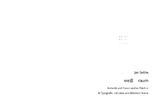Citation link:
http://dx.doi.org/10.25819/ubsi/5395Files in This Item:
| File | Description | Size | Format | |
|---|---|---|---|---|
| Bild_Kunstwissenschaften_12_Seithe.pdf | 74.5 MB | Adobe PDF |  View/Open |
| Dokument Type: | Doctoral Thesis | metadata.dc.title: | weiß raum | Title addition: | Ästhetik und Poesie weißer Flächen in Typografie, Literatur und bildender Kunst | Other Titles: | White space : aesthetics and poetry of blanks in typography, literature and the visual arts | Authors: | Seithe, Jan | Institute: | Germanistisches Seminar | Free keywords: | Kunstgeschichte, Weißraum, Leerraum, Auslassung, Zeichenfläche, Konkrete Poesie, Art history, Painting, Drawing, Graphic art, Typography, White space, Blank | Dewey Decimal Classification: | 700 Künste und Unterhaltung | GHBS-Clases: | KAO ARU BKF |
Issue Date: | 2020 | Publish Date: | 2020 | Series/Report no.: | Reihe Bild- und Kunstwissenschaften | Source: | Siegen : universi - Universitätsverlag Siegen, 2020. - ISBN 978-3-96182-049-8 | Abstract: | Weißräume stellen jene unbedruckten und nicht bezeichneten Stellen eines Textes oder einer Zeichnung dar, die den Blick auf den Zeichenträger, das weiße Blatt Papier, freigeben. Jene materialen Aussparungen, welche in der Regel übersehen werden, stellen sich als Bestandteile von Texten und Zeichnungen heraus, die diese gerade erst hervorbringen. Über ihre rein strukturbildliche Funktion hinaus können Weißräume poetisch und ästhetisch wirken. Typografen, Schriftsteller und Zeichner der Moderne bedienen sich der optisch ins Auge fallenden Leerstelle als bedeutungstragendes Zeichen. In seiner Vieldeutigkeit und Offenheit offenbart sich der Weißraum als produktives Stilmittel moderner und post-moderner Ausdrucksweisen. Die interdisziplinäre Arbeit entwickelt parallel und in wechselseitiger Erhellung das Phänomen der Weißräume in Literatur und bildender Kunst. Dafür wird der typografische Fachbegriff „Weißraum“ zur Beschreibung schriftstellerischer Textlücken herangezogen und als Ausdruck freier Partien in Zeichnungen für den bildwissenschaftlichen Diskurs entlehnt. Aus phänomenologischer, semiotischer und wirkungsästhetischer Perspektive wird das dialektische Verhältnis schwarzer Zeichen und weißer Flächen in literarischen Texten und künstlerischen Zeichnungen beleuchtet, um die poetische und ästhetische Wirkungsweise künstlerisch verwendeter Weißräume zu klären. Anschließend beschreibt die Arbeit in einem umfangreichen historischen Kapitel die Entwicklung des Weißraums in der Literatur und bildenden Kunst vom Symbolismus bis zur Gegenwart. White spaces are the blank or unprinted part of a text or drawing revealing the view on the character base, the white piece of paper. Usually, these material recesses are overlooked. They represent those parts of the texts and drawings that bring them forth in the first place, though. In addition to their purely structural function, white spaces can have a poetic and aesthetic effect. Typographers, writers and draughtsmen of Modernism use the visually striking blank space as a meaningful sign. In its ambiguity and openness, the white space reveals itself as a productive stylistic device of modern and post-modern modes of expression. The interdisciplinary work at hand develops the phenomenon of white spaces in literature and visual arts in parallel and in mutual illumination. To this end, the typographical term "white space" is used to describe gaps in the texts of writers and is borrowed as an expression of free parts in drawings for the discourse of image studies. From a phenomenological, semiotic and receptive-aesthetic perspective, the dialectical relationship of black signs and white spaces in literary texts and artistic drawings is examined in order to clarify the poetic and aesthetic impact of white spaces used by artists. Subsequently, this work describes the development of white space in literature and fine arts from symbolism to the present in an extensive historical chapter. |
DOI: | http://dx.doi.org/10.25819/ubsi/5395 | URN: | urn:nbn:de:hbz:467-17094 | URI: | https://dspace.ub.uni-siegen.de/handle/ubsi/1709 | License: | http://creativecommons.org/licenses/by-sa/4.0/ |
| Appears in Collections: | Universi Hochschulschriften |
This item is protected by original copyright |
Page view(s)
1,093
checked on Nov 25, 2024
Download(s)
456
checked on Nov 25, 2024
Google ScholarTM
Check
Altmetric
This item is licensed under a Creative Commons License


